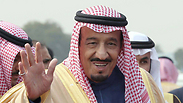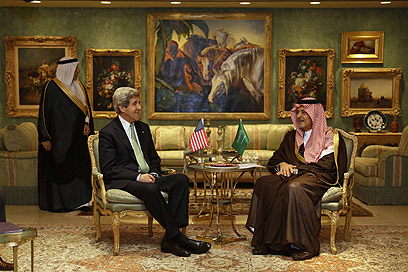
Any terms that world powers grant Iran under a nuclear deal will be sought by Saudi Arabia and other countries, risking wider proliferation of atomic technology, a senior Saudi prince warned on Monday in a BBC interview.
"I've always said whatever comes out of these talks, we will want the same," said Prince Turki al-Faisal, who has previously served as head of Saudi intelligence and Riyadh's ambassador to Washington and London but is no longer a government official.
"So if Iran has the ability to enrich uranium to whatever level, it's not just Saudi Arabia that's going to ask for that. The whole world will be an open door to go that route without any inhibition, and that's my main objection," he said.
US Secretary of State recently flew to Riyadh to calm Saudi nerves, but according to the BBC, the kingdom told him that Iran's support for radical Shiite group like Hezbollah were harming local stability.
"Iran is already a disruptive player in various scenes in the Arab world, whether it's Yemen, Syria, Iraq, Palestine, or Bahrain," said Prince Turki.
"So ending fear of developing weapons of mass destruction is not going to be the end of the troubles we're having with Iran," he told the BBC.
Nuclear efforts continue
The US and Iran are plunging back into negotiations in an effort to end a decades-long standoff that has raised the specter of an Iranian nuclear arsenal, a new atomic arms race in the Middle East and even a US or Israeli military intervention.
Two weeks away from a deadline for a framework accord, some officials said the awesomeness of the diplomatic task meant negotiators would likely settle for an announcement that they've made enough progress to justify further talks.
Such a declaration would hardly satisfy American critics of the Obama administration's diplomatic outreach to Iran and hardliners in the Islamic Republic, who have become more vocal as the parties have narrowed many of their differences.
And, officially, the United States and its partners insist their eyes are on a much bigger prize: "A deal that would protect the world from the threat that a nuclear-armed Iran could pose," Secretary of State John Kerry emphasized this past weekend.
Yet as Kerry arrived in Switzerland for several days of discussions with Iranian Foreign Minister Mohammad Javad Zarif, no one was promising the breakthrough. One diplomat said new differences surfaced only in the last negotiating round of what has been a 15-month process, including a sudden Iranian demand that a nuclear facility buried deep underground be allowed to keep hundreds of centrifuges that are used for enriching uranium - material that can be used in a nuclear warhead.
Previously, the Iranians had accepted the plant would be transformed into one solely for scientific research, that diplomat and others have said.
The deal that had been taking shape would see Iran freeze its nuclear program for at least a decade, with restrictions then gradually lifted over a period of perhaps the following five years. Washington and other world powers would similarly scale back sanctions that have crippled the Iranian economy.
Iran says it is only interested in peaceful energy generation and medical research, but much of the world has suspected it of maintaining covert nuclear weapons ambitions. And the US and its ally Israel have at various times threatened military action if Iran's program advances too far.
Speaking Sunday on CBS, Kerry said most of the differences between Iran and the negotiating group of the US, Britain, China, France, Germany and Russia were "political," not technical. He didn't elaborate, but political matters tend to include levels of inspections, Iran's past military work linked to its nuclear program and how quickly to scale back sanctions.
Technical matters refer, for example, to how many centrifuges Iran can maintain, what types of those machines and how much plutonium it would be allowed to produce from a planned heavy water reactor.
Less than four months ago, senior officials talked optimistically about reaching a preliminary agreement by March, with three months of additional talks only for any remaining technical work. Back then, British Foreign Secretary Philip Hammond said he expected "an agreement on substance" by March 31.
But two diplomats said ahead of this week's talks in the Swiss city of Lausanne that persistent differences at the negotiating table had diminished the chances of such a substantial agreement. They weren't authorized to speak publicly about the sensitive talks and demanded anonymity.
A senior US official rejected that assessment. "We are working toward a framework of substance," said the official, who spoke on condition of anonymity, citing similar constraints. Top diplomats and technical experts from the US and Iran met Sunday. Kerry and Zarif were to hold their first discussion Monday.
In his interview, Kerry said Tehran "to its credit" has entirely lived up to an interim agreement reached in November 2013.
But that understanding was only a stopgap measure, not doing nearly enough to satisfy the long-term concerns of Israel or Iran's Sunni Arab rivals in the Middle East, or the United States. Experts say the combination of limits on Iran's uranium program only gives the world two to three months to react if the country tries to surreptitiously "break out" toward nuclear weapons development. The US says it needs at least a year of reaction time, lasting for at least a decade, in a comprehensive agreement.
Fearful Iran could be playing for time, Obama, Kerry and various officials have vowed to walk away from the talks if they show no sign of pointing toward a satisfactory agreement. And they've repeatedly stressed that "no deal is better than a bad deal." But none of them have spelled out what the US strategy for preventing a nuclear-armed Iran would be then.
Reuters contributed to this report
















